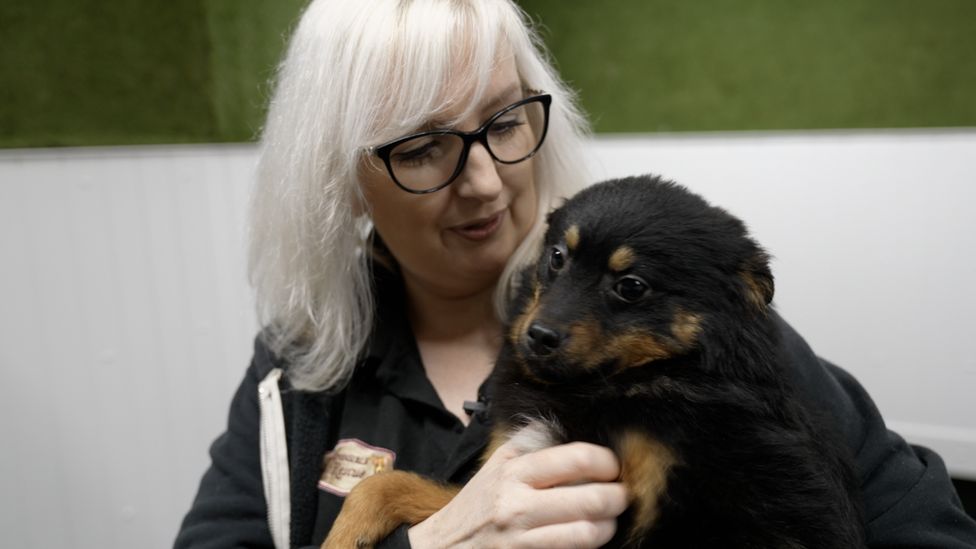Puppy and kitten smuggling crackdown moves step closer in Commons
- Published

The government will "fully support" new legislation to combat puppy and kitten smuggling, MPs have been told.
A bill banning the import into the UK of puppies, kittens and ferrets under the age of six months has cleared its first Commons hurdle.
Heavily pregnant animals and those with mutilations such as cropped ears or a docked tail would also be covered.
Private members' bills which get government backing stand a greater chance of becoming law.
Despite this, there is no guarantee the bill will become law before a general election, expected later this year.
Ministers first promised to raise the age at which puppies can be imported in 2021, but dropped their legislation in 2023.
Conservative MP Selaine Saxby said her Animal Welfare (Import of Dogs, Cats and Ferrets) Bill would ensure that pets were not sold or traded as objects.
Opening a Commons debate, the North Devon MP said: "As a dog owner myself, it is horrific to hear stories of puppies and kittens being smuggled across the border, and the poor conditions they have to endure.
"Pets are more than just property, they are family." Her bill would deliver a Tory manifesto commitment by "closing loopholes exploited by unscrupulous commercial trading," she added.
The RSPCA said the measures would stop people "making a quick buck out of the suffering and exploitation of animals", but some organisations which rescue dogs from abroad worry that raising the importation age could put vulnerable puppies at risk.
Former Deputy Prime Minister Therese Coffey gave her backing to the legislation, but urged ministers to roll out its measures swiftly.
She raised concerns that rules limiting the number of pets a person can travel with would not come into force when the bill became law. "I appreciate there might be transition, but at the moment it says six months," she said.
'Mutilated'
The Commons also heard from Conservative Neil Hudson, a vet, that Disney Pixar films such as Up and celebrity culture were normalising ear cropping in dogs.
"If you look really closely at the dogs in that film, many of them are cropped. And so if people are going to the cinema with their kids, and seeing this on the big screen, that looks normal and that is wrong.
"So we need to educate people that these dogs have been horrifically mutilated," he said.
Ms Saxby told MPs that despite not receiving "strong representations" from the ferret-owning community, ferrets were included in the bill because they were in the same category as dogs and cats when it came to the risk of rabies.
Labour MP Samantha Dixon joked that the Commons had not discussed ferrets enough, as opposed to government "reverse ferrets", in the current Parliament as she also spoke in favour of the bill.
During the debate it was revealed that Attorney General Victoria Prentis used to have a pet ferret, called Roulette.
Environment minister Mark Spencer confirmed the government would back the legislation, telling the Commons: "I would like to thank (Ms Saxby) again for taking forward this important bill, and look forward to seeing it progress through the remaining stages in the House and in the other place (House of Lords)."
Labour has indicated it will back the bill, but has accused the Conservatives of having "bottled their manifesto promises".
Major animal welfare charities, such as the Dog's Trust, Battersea Dogs and Cats Home, and the RSPCA, have backed the proposals after years of campaigning.
Under the current rules, puppies can be imported from the age of 15 weeks.
Amy Ockelford, from the RSPCA, said raising the age would help prevent puppies being taken away from their mothers too early and being put at risk of disease and behavioural problems.
"It's also making them less marketable to the people who are exploiting their cute puppy charms because they'll be a little bit older by the time they come into the country, a little bit healthier and those welfare issues won't be so significant.
But some dog rescue organisations have expressed concerns. Rachael O'Regan runs a not-for-profit company, The Responsible Dog Rescue, in Southport, which rescues dogs from Romania.
She says the harsh winter weather combined with conditions in public dog shelters and the prevalence of potentially fatal diseases such as parvovirus make young puppies very vulnerable.
"The chances of them contracting an illness and suffering as a result of that, potentially dying, are massively increased. The behaviour issues and being able to correct those and being able to train them becomes more difficult if you are bring them over from six months onwards.
"It's immediately making the job more difficult for the rescuers and for the adopters."
Definitive figures for the number of puppies smuggled into the country do not exist, but, between 2015 and 2023, the Dog's Trust reported that it had rescued more than 3,000 dogs linked to illegal imports.
According to government figures, 116 puppies and kittens were quarantined at the Port of Dover in 2023 for being below the current legally-required minimum age for import.
The new bill would limit - to five by car, or three on foot - the number of cats and dogs people can travel with, to stop traders using the Pet Travel Scheme to smuggle in animals, pretending they are their own pets.
This measure would apply in England, Scotland and Wales.
Painful cosmetic procedures, such as ear-cropping and declawing, are already illegal in the UK.
Ear cropping involves removing all or part of a dog's ear flap, while declawing is partially amputating a cat's toe.
- Published7 December 2023
- Published25 May 2023
- Published21 August 2021